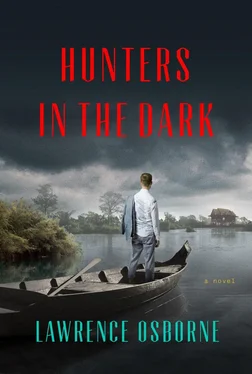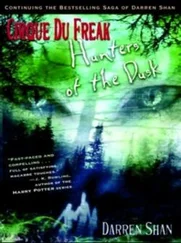“Is there a cabin by the river we can have?”
“Aye, Robert Louis Stevenson is available.”
“What about Rob Roy?”
“Nay, it’s for the missus.”
“All right, we’ll take Stevenson. Is there a mosquito net?”
“Obviously there is. There’s air con in the wee hours too.”
“Luxury. How much?”
“We’ll talk about it later.”
The tea came and they relaxed. Sothea flirted with the Scot, and the Scot softened as if succumbing to the spirit of the place and soon the warm gin was out and they were recalling the last time they went to Phnom Penh together.
“But,” Mick said, “ye’ve not been down there in a while.”
“No, I was renting a place on the river and liking it. Sothea here persuaded me not to go down and she was right.”
“Aye, women always are.”
They were now aware of a group of Khmer girls and older women sitting by the kitchen and watching them while they peeled vegetables with knives. There was a cool sarcasm about them. The Moonrise was not, in the end, a casual or relaxing place. It had desperation written all over it, a desperate attempt to make a little paradise on land bought from a Khmer Rouge warlord. The bowls on the tables were, like the lamps, made from shell casings and the ashtrays too. Simon had always wondered how the mad Scot lived here with his Khmer groupies and his bastard children but it was not a question that ever needed to be answered. It was happiness of a kind and one had to end up somewhere. He had not done so badly for himself. Then he thought of the heroin and the cash in the car and he considered that the best thing to do was just carry them over casually to the cabin and not say a thing. He could see the path that led down to the river with the yellow tape on either side and the same warnings about land mines. The whole property was still mined and most of it was off-limits. One had to be careful about getting too liquored up at night and wandering back to one’s cabin outside the marked paths. It was the place to be because it was so remote and so safe. It was alarming about the English couple arriving but one could, presumably, dance around their cluelessness.
Before the rain, Mick walked with them down to the cabin on the river. It stood on a steep bank surrounded by papaya trees. Its wooden terrace looked straight down into the black and ominous river, along which grew what looked like prickly poppy flowers. There was a musty scent in the air, a smell maybe of distant fire smoke.
They laid the suitcase on the terrace and the Scot opened the door for them and turned on the rickety AC to take the edge off the stifling heat. Inside it was bare enough: a bed and a rocking chair.
“Dinner at six. I hope the English aren’t here yet.”
“Me too,” Simon said. “When are they supposed to be?”
“Nae way of saying. They’re coming overland from Thailand.”
“Bloody bad manners. All right, we’ll come up for dinner.”
“The wife is making haggis.”
“Christ.”
“Just joking, ye bastard. It’ll be omelette with chilies.”
When he had gone, Simon and Sothea stretched out on the bed and decided not to shoot up. They could have sex instead. The calm and torpid river seemed to encourage this gentler course of action, its sounds now so close that they subdued all others. The windows had no curtains and so they watched the sky and fell asleep for some time. But Simon, in reality, was thinking continuously. How had his life fallen so low from such heights? He was not a bad person judged by ordinary measures; he had never harmed anyone physically. He had taken Robert’s money, and indeed his name, but Robert had not worked for that money, he had chanced upon it by luck while gambling in a warlord-owned casino. It was hardly clean. A man who wins dirty money is not in a position to defend it from a moral position, he will do so only from self-interest. And so self-interests collide. So what? There will be merely a winner and a loser, those most inevitable of archetypes. One might as well be the winner.
Besides, he had done the English boy a favor. Simon could spot a would-be deserter a mile away. They usually just didn’t have the courage to follow their less conscious desires. They needed a nudge and he had given Robert that nudge. It hadn’t harmed him at all.
He kissed Sothea’s naked arm with its dark superstitious tattoos. They had been living together for a year, brought together by dope, but he still didn’t know anything about her. She had been a waitress in a bar in Battambang but she had ambitions to go to school and become a vet. Was it possible for her to become a vet? He didn’t know. The country was an enigma to him, a forest of confusing signs. And yet it seemed like the easiest of passages from his life in New York to his life here — a matter of a few years during which he had managed to go through a large part, if not all, of his inheritance while doing little more than spinning in the dark. But for Sothea it was a different matter. For her, his self-indulgence was a ticket to somewhere else, though where that was, she had not figured out. Still, she could smell with an infallible instinct his family money, his ease and his self-confidence. There was no mistake about him — he was good luck.
How wrong she was, he thought. The only thing he had going for him was a good education and that was far in the past and as useless as everything else in the past. What a shame he had never taken her to Montauk or the lighthouse at the far end — or to a party overlooking the park. As it was he had to tell her about it over and over. She could not understand why he had left that world for hers.
—
Soon, an electric bell rang out over the darkening forests. It was the Scot’s eccentric dinner bell. He shook the drowsy girl awake and they dressed and went out into a heavy, rainy dusk with a mist rolling down the snaking river. At the loggia, the English guests had still not arrived.
“The driver called,” Mick said, “they’re still at the border.”
Let’s eat quickly then, Simon wanted to say.
“They won’t be here for an hour,” he did say. “Let’s eat now, if it’s all right with you.”
The military lamps came on and the girls laid out mosquito coils. From the wall of trees the frogs barked unseen and raindrops fell from the higher branches with a commotion of their own. They ate a creamy coconut curry made with chicken legs and jasmine rice and with it tall Lao beers. Mick told him, for the thousandth time, how he had come to buy the land from a crony of the former regime strongman Ta Mok and how he had come to make all these handsome furnishings from military material. That piece of shrapnel — it came from a mine in Angola. He knew all about mines. Just as he explained this there was a distant, muffled detonation from far off in the forest and Mick and the girls began laughing. His wife came over and showed them their new baby and the baby was laughing too.
“It’s just a deer,” he said to the other two. “We hear one or two every twenty-four hours. They step on the mines and turn into clouds of blood. It’s quite a sight in the day.”
Sothea turned a wary eye upon her protector. She didn’t like it that deer were blowing themselves up.
“It’s all right,” Simon said into her ear. “They don’t feel a thing. Just pop! ”
“Aye,” the Scot said, “a deer is not the smartest.”
“Clouds of blood?” she said.
Simon shrugged. Such was life.
He could sense that she was growing more nervous. She needed her hit and he had withheld it from her. Before long, however, they heard the drone of an approaching motor and a flash of headlights cut through the trees and lit for a moment the side of the main house. It also lit the lines of rain and the sweating bark of the ironwoods and one could see that it was a large, filthy local taxi. Mick stood up with a grunt and moved off to greet the car which had just arrived, bringing with it that rarest of gifts, paying guests. There was a hopeful spring in his step. He whipped a hand over his hair. Simon was furious but held his tongue, and he thought about how he could withdraw from the scene without too much fuss. It was, obviously, too late now and he would have to go through with a certain amount of formalities.
Читать дальше












